|
|
|
Sort Order |
|
|
|
Items / Page
|
|
|
|
|
|
|
| Srl | Item |
| 1 |
ID:
131883
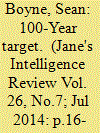

|
|
|
| 2 |
ID:
023603
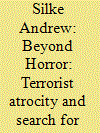

|
|
|
|
|
| Publication |
Jan-Feb 2003.
|
| Description |
37-60
|
|
|
|
|
|
|
|
|
|
|
|
|
|
|
|
| 3 |
ID:
057510
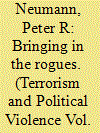

|
|
|
| 4 |
ID:
022338
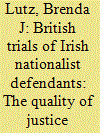

|
|
|
|
|
| Publication |
2002.
|
| Description |
227-244
|
|
|
|
|
|
|
|
|
|
|
|
|
|
|
|
| 5 |
ID:
092310
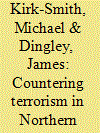

|
|
|
|
|
| Publication |
2009.
|
| Summary/Abstract |
This article aims to review some of the key lessons learnt by the Royal Ulster Constabulary's (RUC) Special Branch in the 37 years of the troubles in Northern Ireland. Above all counter-terrorism is an intelligence led operation and Special Branch are the key agency for this in all UK police forces, who have now benefited enormously from the expertise that the RUC's Special Branch built up over the years and have passed on to their colleagues throughout the UK. Intelligence is more often than not a human role and relies on human agencies, which was the case in Northern Ireland. The bulk of intelligence gathering was carried out at quite low levels although the sifting and analysing of it became a more specialist skill. Electronic intelligence and computerised systems were often quite low down in the order of priorities and uses, which tends to confound popular impressions. Agents, informers and good old fashioned 'coppers' who knew their patch were much more important both in terms of gathering information and in terms of undermining the terrorists morale from within and it was these factors that fundamentally defeated the IRA in Northern Ireland.
|
|
|
|
|
|
|
|
|
|
|
|
|
|
|
|
| 6 |
ID:
112067
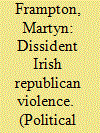

|
|
|
|
|
| Publication |
2012.
|
| Summary/Abstract |
This article considers the resurgence in dissident Irish republican violent activity in the years since 2007. It examines the reasons why this has occurred, citing the significance of 'intra' republican political developments, alongside important 'secondary' factors, such as the death of influential republicans Brendan Hughes and Brian Keenan. It concludes by noting that the dissident threat seems likely to exist for the foreseeable future, but also emphasises the limits of what they can expect to achieve, with there being little prospect of their emulating the Provisional IRA.
|
|
|
|
|
|
|
|
|
|
|
|
|
|
|
|
| 7 |
ID:
171562
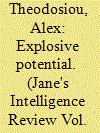

|
|
|
| 8 |
ID:
148909
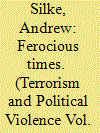

|
|
|
|
|
| Summary/Abstract |
The 1916 Rising was, in military terms, a shambolic failure. Despite the fact that Britain was locked in a gruelling struggle with Germany, the Rising was still utterly crushed within a week. How then, in the aftermath of victory against Germany, did Britain fail to win the subsequent struggle with the Irish Republican Army (IRA) between 1919 and 1921? This article assesses some of the key factors that played out in the conflict, drawing particular attention to the IRA's focus on the Royal Irish Constabulary and the consequences of this, and then later, how distorted perceptions of the proximity of success ultimately undermined British commitment. One of the most remarkable features of the conflict was the widespread belief among many on the British side (and more than a few in the Republican camp) that the IRA was on the verge of total defeat when the truce was declared in 1921. The IRA had suffered heavy casualties and were running low on weapons and ammunition. Yet, somehow the movement prevailed. This article aims to shed light on how and why that happened.
|
|
|
|
|
|
|
|
|
|
|
|
|
|
|
|
| 9 |
ID:
148918
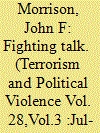

|
|
|
|
|
| Summary/Abstract |
With the advent of the new violent dissident merger, “The IRA/New IRA,” the group and its affiliates have had to legitimise their new existence. They have utilised the maintenance of paramilitary activity to achieve this. However, they have also produced a number of organisational statements, justifying their position, tactics, and strategies. This article analyses the evolution of these statements, both pre and post-merger from 2007 to 2015. 126 individual statements and four magazines are analysed using grounded theory. This analysis found that the statements have a dual strategy, aiming to foster trust in the movement and distrust in their perceived enemies. One of the dominant ways in which the group aims to foster trust is by proposing their possession of an historical mandate from the republican forefathers of 1916, as well as the internally lauded paramilitaries from The Troubles-era Provisional Irish Republican Army. The focus of the distrust narrative has been on the “constitutional nationalism” of Sinn Féin. However, it also pours scorn on the Police Service of Northern Ireland, and capitalism, across the island of Ireland. The analysis of these statements can provide us with an understanding of the future direction of the group, as well as giving us insight, which can inform the development of any counter-narrative.
|
|
|
|
|
|
|
|
|
|
|
|
|
|
|
|
| 10 |
ID:
163740
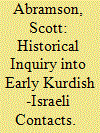

|
|
|
|
|
| Summary/Abstract |
This study traces the progress of the contacts between Israelis and Kurds—two non-Arab regional minorities intent on self-government and encircled by enemies—in their earliest stage of development, from the two peoples’ first flirtations to the preliminaries of the Israeli-Kurdish entente against Baghdad in the 1960s and 1970s. Irregular in occurrence and anticlimactic in outcome, these early contacts unfolded over three decades in the form of unrequited overtures, dud proposals for cooperation, and stillborn bids for an alliance. Yet for all of these dead-ends, the path along which these early contacts proceeded was, as this article establishes, pursued by the very same Israelis and Kurds, impelled, in turn, by the very same strategic logic, that would lead the two peoples in due course into an alliance.
|
|
|
|
|
|
|
|
|
|
|
|
|
|
|
|
| 11 |
ID:
096701
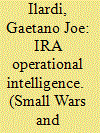

|
|
|
|
|
| Publication |
2010.
|
| Summary/Abstract |
This article will seek to provide a detailed examination of the IRA's operational intelligence methodologies. Providing not only a lengthy discussion on the organization's intelligence collection protocols, it will also examine the interplay between intelligence and IRA decision-making. It will be contended that intelligence's influence resided in its ability to introduce a strong element of predictability into the IRA's decision-making process. This depended on an ability to construct a detailed intelligence picture of the target and its geographical milieu so as to minimize the likelihood of volunteers encountering unforeseen circumstances that could adversely affect planned or anticipated outcomes.
|
|
|
|
|
|
|
|
|
|
|
|
|
|
|
|
| 12 |
ID:
177700
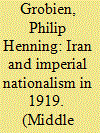

|
|
|
|
|
| Summary/Abstract |
Interposed between the Constitutional Revolution and the rise of Reza Khan, Iran began a foreign diplomacy that asserted a nuanced nationalism. After the devastation of the First World War, Iran sent a commission to the Peace of Paris. There, Iran put forward a nationalist programme which sought a sovereign and independent Iran, and the return of territory lost since 1828. Whilst many facets in this nationalist programme had been articulated before 1919, it is the consolidation within one programme which makes this programme unusual. It was also the first time such a great number of specific territorial claims were made. This imperial nationalism, requires an assessment within the narrative of Iranian nationalism, and will be explored in this article.
|
|
|
|
|
|
|
|
|
|
|
|
|
|
|
|
| 13 |
ID:
189843
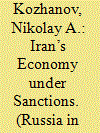

|
|
|
|
|
| Summary/Abstract |
Iran’s economy has lived under sanctions for the last forty years. Yet their
pressure has been uneven: the most sensitive measures were applied against
Iran by the U.S. and its partners in 2010–2015 and in 2018–2022. However,
despite gloomy expectations of grave consequences for Iran’s economy,
it has managed to survive: it has been damaged but not shattered. The
Iranian government has succeeded in securing control over the domestic
political situation. Even though Tehran has been unsuccessful in completely
offsetting the negative impact of the sanctions, it has mitigated their effect
in the short term and won time necessary for devising a long-term program
of anti-sanctions measures. This article analyzes the impact of sanctions on
Iran’s economy with a special focus placed on the factors that determined
their partial success/failure. The paper also analyzes the lessons Iran could
draw from its experience in resisting U.S. sanctions that may be helpful
in counterbalancing the short- and long-term impact of the current U.S.
pressure on the country’s economy.
|
|
|
|
|
|
|
|
|
|
|
|
|
|
|
|
| 14 |
ID:
094077
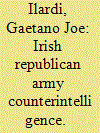

|
|
|
|
|
| Publication |
2010.
|
| Summary/Abstract |
The collection of intelligence, whether by the Irish Republican Army (IRA) or the British security forces, became a means and, indeed, an extension of the struggle by which each side sought to assert its dominance and control over the direction and tempo of the Northern Ireland conflict. The implications of this intelligence war were far-reaching, impinging on almost every aspect of the conflict. In addition to its more obvious impact, such as its capacity to determine the outcome of individual operations, intelligence could also influence the conflict in more subtle ways. For instance, the security force's ability to acquire quality intelligence minimized the need to conduct house searches, a practice which proved immensely unpopular among the Nationalist community. From the earliest stages of the Troubles, both sides were engaged in a do or die struggle to control the flow of intelligence. For each, intelligence was crucial to assuring certainty and control for itself, while depriving both from the enemy. For both sides this became the function of counterintelligence.
|
|
|
|
|
|
|
|
|
|
|
|
|
|
|
|
| 15 |
ID:
157822
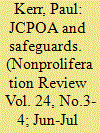

|
|
|
|
|
| Summary/Abstract |
Although the nuclear safeguards established in the 2015 Joint Comprehensive Plan of Action (JCPOA) are explicitly confined to application in Iran, some experts and policy makers have considered whether these supplementary measures could be applied to other states of proliferation concern. While the JCPOA has provided some useful additions to the International Atomic Energy Agency (IAEA) safeguards toolkit, its legacy for the broader IAEA safeguards mission is unclear. To better assess this potential legacy, this article considers the JCPOA in the context of the evolution of safeguards, particularly the developments following the 1991 Gulf War and subsequent changes to safeguards implementation in Iraq. The article then describes the JCPOA’s safeguards in Iran and the potential to apply similar provisions elsewhere.
|
|
|
|
|
|
|
|
|
|
|
|
|
|
|
|
| 16 |
ID:
148910
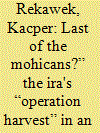

|
|
|
|
|
| Summary/Abstract |
In 1956, the Irish Republican Army (IRA) launched “Operation Harvest,” an overtly ambitious guerrilla effort that was meant to secure the political unity of Ireland by force of arms. It was waged against the backdrop of a “thaw” in international relations and drew inspiration from successful anti-colonial guerrilla struggles in Algeria and Cyprus. The IRA was unaware of the simultaneous, parallel, unsuccessful irredentist efforts in Central and Eastern Europe in which anti-communist guerrillas clashed with totalitarian security apparatuses of the USSR or its satellite states. Studying the latter campaigns, which had begun earlier and were conducted by far larger and more effective guerrilla forces, might have convinced the organisation that such insurgencies in post-1945 Europe had very little hope of success. This article for the first time thematically contrasts the irredentist efforts of the IRA and the parallel Central and Eastern European guerrillas. It aims to bring to light cases that are hardly ever discussed in the Irish context but which could be of surprising use if one wishes to comparatively assess Ireland or the IRA.
|
|
|
|
|
|
|
|
|
|
|
|
|
|
|
|
| 17 |
ID:
146772
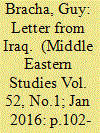

|
|
|
|
|
| Summary/Abstract |
The most extensive participation of Jews in the literary Arabic revival (The Nahda) was in monarchial Iraq. Jewish Intellectuals had contributed to the development of national Iraqi culture. These intellectuals have been studied in the context of the non-Jewish Iraqi intellectuals, focusing on their national and cultural integration in the new Iraqi state. This article observes the participation of those intellectuals in two non-Iraqi Jewish journals which were published in literary Arabic, Israʾil, published in Cairo, and al-ʿAlam al-Israʾili, published in Beirut. By changing the point of view from Iraqi Jews in the non-Jewish Iraqi cultural sphere to Iraqi Jews in a non-Iraqi Jewish cultural sphere, the article examines their relation between Iraqi identity and the national Jewish identity.
|
|
|
|
|
|
|
|
|
|
|
|
|
|
|
|
| 18 |
ID:
023128
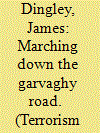

|
|
|
|
|
| Publication |
2002.
|
| Description |
42-79
|
|
|
|
|
|
|
|
|
|
|
|
|
|
|
|
| 19 |
ID:
182968
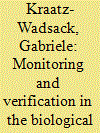

|
|
|
|
|
| Summary/Abstract |
This article provides a brief overview of the ongoing monitoring and verification (OMV) regime in Iraq in the biological-weapons area. As an integral part of the formal ceasefire arrangement in 1991, the United Nations Security Council established an international verification regime encompassing nuclear, biological, and chemical weapons and some ballistic missiles. The verification regime was built on two mutually supportive pillars. One pillar related to disarmament validation, i.e., verifying that all prohibited weapons, facilities, and related items and certain ballistic missiles in Iraq were destroyed or rendered harmless, and all past weapons-of-mass-destruction (WMD) activities had ceased. The second pillar was ongoing monitoring to continuously verify that non-proscribed activities were not being diverted to reconstitute WMD programs. Biological-weapons disarmament and OMV in Iraq provide an example of an effective system that may serve as a reference point for future efforts.
|
|
|
|
|
|
|
|
|
|
|
|
|
|
|
|
| 20 |
ID:
157820
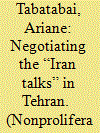

|
|
|
|
|
| Summary/Abstract |
When Iran and the world powers resumed negotiations over Tehran’s controversial nuclear program after a seven-year lull, Iran’s hardline President Mahmoud Ahmadinejad was approaching the end of his second and last term. During that time, little progress was made. After the election of the moderate Hassan Rouhani to the presidency, the talks resumed decisively. Rouhani and his team were in an ideal position to strike a deal, as they were afforded cross-party support supplying them with political will and political capital. To succeed, they had to pursue several goals, including sanctions relief and reintegrating their country into the international community, while ensuring that the nuclear program remained viable within the limits they had to respect. They also had to balance several audiences in Iran and the broader international scene. They operated within the “red lines” developed to reassure various factions within the regime and populace and formalized by Supreme Leader Ayatollah Ali Khamenei. These priorities and limitations shaped the form, substance, and language of the resulting document, the Joint Comprehensive Plan of Action completed and signed on July 14, 2015, in Vienna.
|
|
|
|
|
|
|
|
|
|
|
|
|
|
|
|
|
|
|
|
|